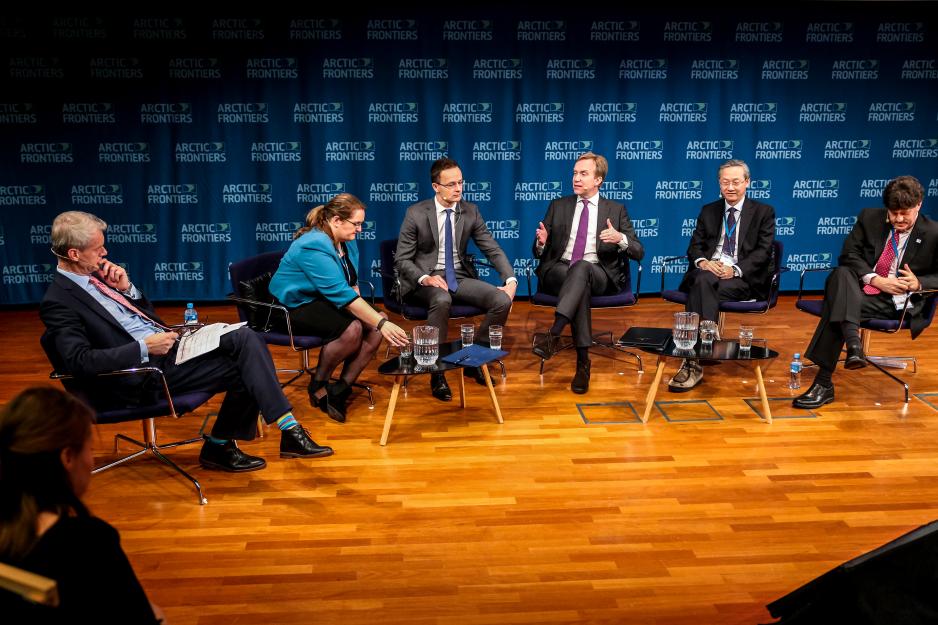Commentary: Creating a meaningful space in the Arctic?

Can Arctic conferences like Arctic Frontiers be arenas for creating a meaningful space in the region? (Photo: Alberto Grohovaz/Arctic Frontiers 2017)
Rather than gathering the largest number of important delegates for a couple of days, can Arctic conferences be arenas for creating a meaningful space in the region? To what extent is the Arctic Frontiers, to be arranged in Tromsø next week, a forum that really promotes dialogue, create synergies and drives developments forward?
Rather than gathering the largest number of important delegates for a couple of days, can Arctic conferences be arenas for creating a meaningful space in the region? To what extent is the Arctic Frontiers, to be arranged in Tromsø next week, a forum that really promotes dialogue, create synergies and drives developments forward?
Like all other buzzwords, "the Arctic" is frequently attached to concepts that are not necessarily exceptional to the region. For instance, is there a unique 'Arctic peace', 'Arctic cooperative spirit' or special 'Arctic institutions'? What is certain, is that the Arctic, as other regions, is inhabited by people living under distinct conditions that for their situation. There are unique challenges attached to living in the High North. These need to be addressed and solved on the community level, by people with know-how and experience.
To this end, the vast number of Arctic conferences taking place each year, gathering a variety of politicians, bureaucrats, scientist, academics and students, industry and business delegates, NGOs, intergovernmental organizations and indigenous peoples' representatives should be ideal arenas. Are they?
Assuming the organizers of the upcoming Arctic Frontiers conference in Troms aim to create such a meaningful space for dialogue and development in the Arctic, to what extent do they succeed?
On the plus side, the topic of the 2018 conference – "Connecting the Arctic" – is in line with one of the priorities in the current Finnish Arctic Council Chairmanship program. This is valuable, as it necessary that various institutions pull in the same direction to achieve concrete outcomes. Secondly, this is a business heavy conference. While it does not contribute to devaluating its "elitist" reputation, it has virtues in terms of involving and educating industries looking to establish themselves in the region.
The urgency to strike a balance between sustainable development, environmental protection and commercial interests in the Arctic is widely recognized. Therefore, it is necessary to ensure new actors have sufficient knowledge about the conditions in the Arctic – both in terms of the fragile environment and how to ensure the well-being of the region's inhabitants.
Further, the Open Arctic arrangements, an attempt to include the local community, is something the organizers should be given credit for. There are several of these at the 2018 conference, which are free for all to attend. Additionally, the regional focus is positive. Gathering mayors and other regional representatives is a concrete measure that can contribute to driving developments forward. These participants can share best-practices, and learn from other similar communities in the North on how to best develop the society under challenging conditions.
On the other side, the cost of participation of the Arctic Frontiers is a recurrent criticism, which also underscores its elitist character. As other conferences, the Arctic Frontiers aims to be an international arena gathering a variety of stakeholders to discuss challenges and opportunities in the region.
However, the program is fairly Norwegian dominated, and the conference has a reputation internationally for being too costly, and primarily a communication channel for Norwegian interests and priorities in the region.
If this is to improve, the conference organizers also need to do something about the separation into distinct policy, science and business days. With the current format, one can ask how it is possible to really create synergies between sectors, and to implement the desired policy-science interplay? Moreover, as the policy section concludes at noon on Tuesday, how many politicians actually stay for the rest of the conference, to listen and gain information they can bring forward into the decision-making process?
Still, the task of creating a meaningful space in the Arctic through conferences is not only the responsibility of the organizers. Perhaps if all participants decided to leave the conference with three concrete initiatives to follow up at home, either at the individual, institutional or organizational level, we could start seeing more concrete outcomes from these events.

